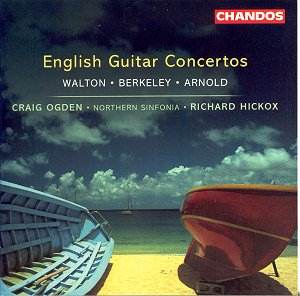As a rule I am not keen on any added orchestral accompaniment
to works that were originally intended for a solo instrument, usually
they end up trying to be something they are not. However in the case
of William Walton’s "Five Bagatelles for Guitar" Patrick
Russ has done an excellent job. His sympathetic arrangements retain
much of the written guitar part and general flavour of Walton’s original.
The orchestra is never intrusive on the guitar, but always complements
it.
A good example is in Bagatelle No.3 where a solo bassoon
takes the opening seven bars - the guitar taking over at bar 8, seems
quite natural. From bar 16 (marked "espress") the guitar
is as the solo version sharing duties with the Cor Anglais at bar 28.
Patrick Russ has elected to repeat bars 36-43 and allow the orchestra
to swell the proceedings until the guitar once again joins them for
the last 8 bars; all very convincing. In the main Bagatelle No.2 is
again as its counterpart solo guitar piece was conceived, aided only
by light orchestration with solo flute and cello figures at bars 41
and 66 respectively. The two outer Bagatelles, Nos 1 and 5, are treated
in a much more dramatic way which ensures a strong opening and close
to the set.
Lennox Berkeley had already written two solo
guitar works for Julian Bream (the "Sonatina" Op.52 No.1 (1958)
and "Theme and Variations" Op.77 (1970)) by the time he wrote
his "Guitar Concerto" Op.88. As a composer Berkeley was something
of a traditionalist, his music tonal in outlook. However with
this work he veers towards atonality but on his own terms. The
result is a most engaging piece of work masterfully crafted.
Whatever musical qualities Berkeley and Walton have
(albeit aided by Russ) in negotiating the notorious difficulties of
the relatively small sound of the guitar integrated with an orchestra,
the honours must go to Malcolm Arnold. His "Guitar Concerto"
Op.67 must rank as one of the best for the instrument, bar none. Like
Berkeley, Arnold had already written a substantial piece for guitar,
"Serenade for Guitar and Strings"Op.50 but the Concerto proved
to be a giant step forward musically. The first movement, marked allegro,
has two themes of such infectious character, possibly because of Arnold’s
skilful application of modes. The use of the Dorian mode for the first
theme is particularly striking. The central lento-vivace-lento movement,
which at times produces a beautiful oily texture, is a remarkable piece
of writing influenced by the composer's love of jazz, especially that
of the guitarist Django Reinhardt. The finale con brio-piu mosso
is again modal and in the form of a rondo, ending in a
dramatic glissando over two octaves.
The Northern Sinfonia under Richard Hickox are splendid
in their support of guitarist Craig Ogden whose considered approach
to these works is apparent. Of course the strong personality of their
dedicatee, Julian Bream, is ever present but Ogden more than rises to
the task. A fine disc.
Andy Daly


